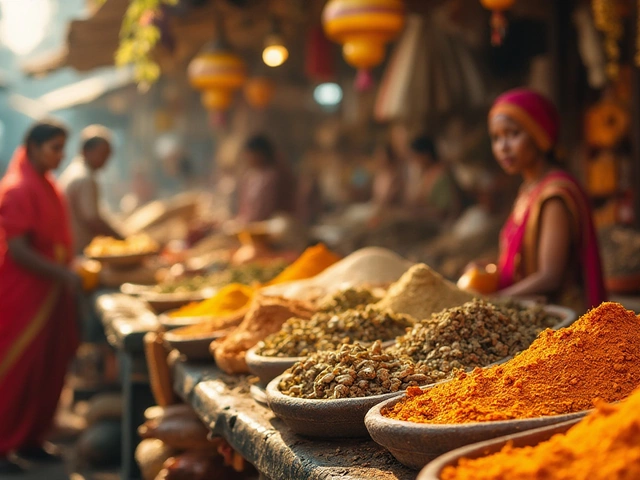Cracking open a bottle of churna powder or lining up for morning yoga at sunrise, a lot of folks in India swear by Ayurvedic medicine. It’s not just a tradition for grandma’s aches anymore—walk into any department store in Delhi, and you’ll find everything from neem soaps to ashwagandha capsules. But does Ayurveda really heal, or is it riding on nostalgia and placebo? There’s a reason this system, with roots tracing back more than 3,000 years, still dominates medicine cabinets across the subcontinent—and increasingly, the world. The truth is tangled in science, ancient wisdom, and a hefty dose of marketing, so let’s sort through the dirt and figure out what actually works.
The Science Behind Ayurveda: Where Tradition and Modern Evidence Clash
Ayurveda is rooted in the belief that our bodies are governed by three doshas—Vata, Pitta, and Kapha. Each one supposedly controls different physical and mental functions. You’ll hear stories about dosha balancing fixing illnesses that stumped regular doctors. On paper, the basic rules look harmless: eat fresh, live with the seasons, stay active. But the real debate starts when Ayurvedic medicines promise to cure diabetes, infertility, or even cancer.
Modern science hasn’t exactly issued a blanket approval. Some of the most respected hospitals in Delhi (like AIIMS) have set up integrative medicine departments to study Ayurveda under microscopes—and frankly, the results are a mixed bag. Research from the Indian Council of Medical Research shows that herbs like ashwagandha can help with stress and anxiety. Several randomized studies back turmeric’s anti-inflammatory punch (even the US National Institutes of Health is looking into it). And triphala? There’s actual data showing it improves digestion and gut health when used correctly. But here’s where it gets tricky. Ayurvedic texts mention hundreds of plants, minerals, and even metals (like lead or mercury compounds) in convoluted combinations, claiming they can detox organs or restore a person’s spiritual “balance.” In reality, heavy metal contamination is a serious problem. Between 2010 and 2023, researchers flagged dozens of branded herbal products sold online and in Indian stores that had dangerous levels of arsenic and lead. Chronic exposure? That can permanently damage your kidneys, nerves, or worse. So, while the ayurvedic approach to lifestyle—eating real, local food, yoga, breathing exercises—gets a scientific thumbs up, blindly popping every capsule labeled “Ayurveda” is asking for trouble.
The Ayurvedic industry isn’t regulated nearly as tightly as regular pharmaceuticals. In 2018, the Ministry of AYUSH tried to clean up shop with stricter guidelines, but walk around Chandni Chowk or browse Instagram and you’ll find plenty of miracle solutions flying under the radar. Still, it’s not just smoke and mirrors: solid clinical trials exist for a handful of herbs. For example, a peer-reviewed study out of Banaras Hindu University in 2022 found that Brahmi (Bacopa monnieri) showed measurable improvements in memory among adults aged 50+. There’s also evidence for shatavari easing symptoms of PCOS and menstrual cramps. But sweeping claims of “all-natural cures” remain shaky without clinical evidence and real regulation.

Experiences, Myths, and the Role of Placebo
Let’s be honest, pretty much every Indian family has Ayurvedic remedies stashed in the kitchen. My neighbour in New Delhi rubs Mahanarayan oil on his bad knee before cricket. My cousin swears by kashayam for colds. Are they all wrong? Not really. There’s power in routine. Drinking tulsi tea, getting a head massage, switching off your phone to meditate—all boost the perception of wellness. But critics claim Ayurveda’s healing is just a subtle placebo effect.
The placebo effect isn’t a dirty trick, though—it’s your brain using expectations to nudge the body toward feeling better. When it comes to joint pain or mild anxiety, studies show placebo pills can ease symptoms in up to 30% of people, even if the medication is fake. Now, when Ayurvedic herbs actually contain active plant ingredients—like Boswellia for arthritis—they might help beyond placebo. A Cochrane review (yep, the gold standard in clinical research) found moderate evidence for Boswellia treating osteoarthritis pain better than a sugar pill, but nowhere near as well as prescription NSAIDs.
On the flip side, Ayurveda myths run wild. The idea that herbal detox cures can “flush toxins” from your liver is dodgy at best. Your liver and kidneys do that already, no magic potion required. Another myth: all natural herbal medicines are safe. Wrong. For instance, the wrong dose of aconite in traditional ash powders can stop your heart. Always check the batch, source, and ingredient list before popping anything medicinal at home.
Where things get convincing is in chronic lifestyle diseases: Type 2 diabetes, stress, belly fat, acne. Diet changes based on Ayurvedic food principles (like eating warm, simple meals, cutting processed sugar, and using spices like cinnamon and fenugreek) line up with what nutritionists recommend anyway. People who follow these routines often see real improvements in blood sugar and digestion, but it’s the habits—eating better, moving daily, managing stress—that do the heavy lifting, not some mystic dosha formula. Still, believing in the process can make it easier to stick to healthy changes. That’s why some doctors recommend Ayurveda alongside Western meds, not as a replacement.

What Works, What’s Hype, and How to Use Ayurveda Safely
Ayurveda can be a fantastic toolkit, but it’s not a one-size-fits-all fix. If you’re dealing with a serious condition—think heart issues, untreated infections, cancer—never ditch prescribed treatment in favor of herbal remedies alone. If your problem is stuff like constipation, stress, minor rashes, or mild arthritis aches, safe Ayurvedic herbs might give relief. But always do your research on the brand and ingredients.
- Check for certifications. Trust only reputable brands that follow GMP (Good Manufacturing Practices) and have AYUSH-approved licenses. Look out for QR codes or certification stamps on packaging.
- Avoid self-prescribing. Ayurvedic doctors (called vaidyas) spend years learning the complex dosha theory and classic texts. Even then, mistakes happen. Don't try to diagnose serious stuff by yourself.
- Read up on possible side effects. Just because something is plant-based doesn’t mean it’s safe for everyone. Guggulu, for example, can mess with thyroid meds. Ashwagandha may spike blood pressure in some people.
- Never mix blindly with Western medicine. Some natural remedies interact with prescription drugs. Always tell your doctor what you’re taking—herbs, teas, powders or oils.
Remember, Ayurveda is all about tweaking your daily routines. Instead of hunting for quick cures, try adding small steps: Steamed dal at lunch, going to bed a bit earlier, a spoon of triphala at night. The ancient wisdom makes sense mainly when used as steady, sustainable habits, not miracle fixes.
Global attention is only growing. In 2023, a study out of Harvard found Indian turmeric supplements sold in the US sometimes contained more fillers than actual curcumin, the active ingredient. Quality varies hugely outside regulated pharmacies. So go local where possible, ask certified practitioners, and run away from anyone promising a fix for everything with one herb.
People have different bodies, mindsets, and needs—it’s silly to think everyone should line up for the same chawanprash. If Ayurveda helps you sleep better, eat healthier, and stay calm, that’s already a win. For complex diseases, though, science-backed drugs remain the mainstay. Blend the best of both worlds and you just might find a balance that keeps you strong, whether you live in New Delhi, New Jersey, or anywhere in between.



